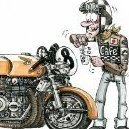[Cambodia] Crossing the border for a lesson in silent meditation
-
Recently Browsing 0 members
- No registered users viewing this page.
-
Topics
-
-
Popular Contributors
-
-
Latest posts...
-
22
Trump's Uncle, Bombers, and Big Headed Baloney: MAGA's Gone Full Cartoon
because our friend louis is not from London or infact England KheoHom. -
75
Crime American Man Arrested at Phuket Airport for Smuggling 6 kg of Heroin
A 61 year old person should a modicum of common sense. -
22
Trump's Uncle, Bombers, and Big Headed Baloney: MAGA's Gone Full Cartoon
"Funny thing...no one reads your whinging." "I didn' take the cookies, mum" said the 5 y/o, his hands full of cookies and his lips full of crumbs.😂 "Aren't you tired of using that same meme over and over? We're tired of seeing it." No, we're not. "I think I have you figured out. You're unsuccessful and angry." That's called projection, buddy. Sorry to see you're feeling like that.💔 -
6
-
33
Mid term disaster! Dems 19%
What happened in 2018? It will be worse for the GQP this time. Much worse. -
28
Crime Russian Teen Nabbed in Midnight Pattaya Graffiti Plot
You're one to talk with that face.- 1
-

-
-
Popular in The Pub





.thumb.jpeg.d2d19a66404642fd9ff62d6262fd153e.jpeg)










Recommended Posts
Create an account or sign in to comment
You need to be a member in order to leave a comment
Create an account
Sign up for a new account in our community. It's easy!
Register a new accountSign in
Already have an account? Sign in here.
Sign In Now